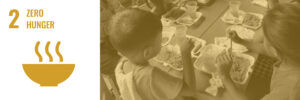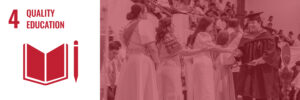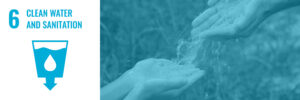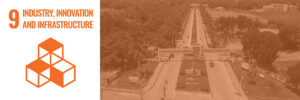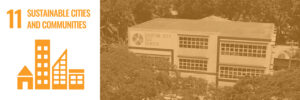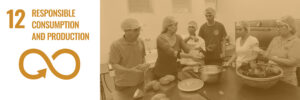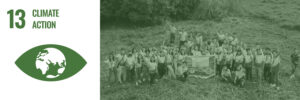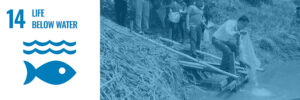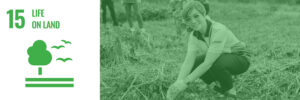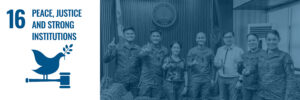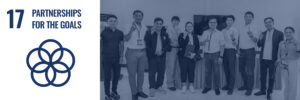2023 – Reports | SDG 14 – Life Below Water

Supporting aquatic ecosystems through education
Educational programs on freshwater ecosystems for local and national communities
Isabela State University-Echague Campus offers the undergraduate program Bachelor of Science in Fisheries and Aquatics Sciences (BSFAS) for local and national communities, making it at the forefront of educational innovation when the sustainability of our aquatic resources is more important than ever. The goal of this four-year undergraduate program is to develop a new generation of competent professionals who can address the urgent issues facing the aquaculture and fisheries industries. In addition to producing capable graduates, ISU’s emphasis on sustainable practices promotes environmental stewardship that has an international impact. The BSFAS program seeks to develop graduates who are globally competitive and knowledgeable in important fields in fisheries, including post-harvest technologies, capture fisheries, sustainable aquaculture, and aquatic resources and ecology. These areas play a key role in ensuring that aquatic ecosystems are managed and used responsibly, which is crucial for biodiversity, food security, and economic growth.
Graduates of this program are expected to:
- Formulate plans and programs for the conservation, protection, development, and sustainability of resources, and in the marketing of products;
- Engage in activities related to education and/or research-development-extension continuum;
- Develop, operate, and manage aquaculture production systems;
- Utilize fisheries resources using innovative fishing methods which are responsible and sustainable;
- Apply post-harvest practices that are compliant with international standards for food safety and quality; and
- Manage and protect the integrity and quality of aquatic ecosystems and resources.
Link: https://isu.edu.ph/course-offerings
Outreach for local and national communities on sustainable management of fisheries and aquaculture
Isabela State University, through the Freshwater Fisheries Center, has made national educational outreach through a feature by the Department of Science and Technology- Philippine Council for Agriculture Aquatic and Natural Resources Research and Development Saribuhay Series on YouTube regarding its project on plant-based freshwater eel feeds for increased immunity against Aeromonas hydrophilla. In this video, Dr. Isagani P. Angeles, Jr., FFC director, discussed the biology, aquaculture importance, purpose of the project, and its promising results and development to help fish farmers enhance freshwater eel growth and immunity. At the 2:33 minute mark of the video, Dr. Angeles discussed how the plant-based feeds were formulated and fed to Anguilla marmorata, a freshwater eel abundant in the Cagayan River system, at different levels in the glass eel stage. This follows a bacterial infection challenge test using A. hydrophilla and was observed for its immune response. Their research revealed a significant immune response upon feeding for five months. He also emphasized the importance of studying its diet and the conservation initiatives the Freshwater Fisheries Center is pursuing to sustain freshwater eel stocks in the Cagayan Valley Region. For wider local community reach, Dr. Angeles explained their project in Filipino.
Link: https://www.youtube.com/watch?v=fPJ5AOY8Hs8
Educational outreach activities for local and national communities to raise awareness on IUU fishing
The Fisheries Administrative Order No. 263, series 2019 is supported by the Isabela State University in providing effective management mechanisms for key species in the Northern Pacific Seaboard of the Fisheries Management Area 1 (FMA 1), key players, and Scientific Advisory Group (SAG) of the Fisheries Management Area (FMA) Northern Pacific Seaboard Management Board. FMA 1 is hosted by the Bureau of Fisheries and Aquatic Resources Regional Office 2, co-led by local government unit representatives, and other key stakeholders within the FMA. ISU is proactive in joining quarterly meetings with the SAG and the management board in making critical decisions for the FMA 1. One of the management measures discussed through these meetings is monitoring, control, and surveillance of the fisheries identified in the Northeast Pacific Seaboard to fight against illegal, unregulated, and unrecorded (IUU) fishing.
Link: https://docs.google.com/document/d/12Y_XBwi_1518TZoHh9vY-mGeD_7An0mO-Q5euY2GHMs/edit?usp=sharing
Supporting aquatic ecosystems through education
Engagements to promote conservation and sustainable fisheries
The Isabela State University actively participates during the quarterly meetings of Fisheries Management Area 1 (FMA 1) bringing together important stakeholders dedicated to sustainable fishing practices along the Northern Pacific Seaboard on January 11, 2023, marking a significant event in the field of fisheries management. A faculty member at Isabela State University-Echague Campus and a representative of the Science Advisory Group (SAG), actively participated in the meeting, which was an important step in promoting collaborative governance and ecological stewardship. To make sure that the proposed restrictions would not only aid in the recovery of these species but also permit ethical harvesting practices, the SAG reviewed stakeholder feedback and available data, which led to a thorough and complex discussion surrounding these measures. The Fisheries Administrative Order 263 calls for the establishment of Fisheries Management Areas, a conservation measure that aims to provide a science-based, participatory, and transparent governance framework and mechanism towards sustainable management through the Ecosystem Approach to Fisheries Management and conservation of marine resources.
Link: https://docs.google.com/document/d/1O7161uAsE2ejl7Mg_Y7Bo6Y9wm7NBQmJT28_Ez5yWu8/edit?usp=sharing
Engagements to maintain existing aquatic plants and animals under threat
ISU supports the national initiative of identifying red-listed aquatic fauna and fauna as a hailed member of the Philippine Aquatic Red List Committee (PARLC) effective 2022 until the present. A workshop reviewing the red-listing process of aquatic fauna and flora was held last November 13-16, 2023 in the participation of ISU. At the event, a presentation was made by ten active subcommittees that are focused on various areas of aquatic life: bony fishes in freshwater, bony demersal fishes in the ocean, bony marine pelagic fishes, cartilaginous fishes, cetaceans, plankton, invertebrates, aquatic snakes, ornamental aquatic creatures, and aquatic plants. The PARLC was established to formulate criteria for determining the status of threatened aquatic wildlife and their classification into internationally accepted categories such as critically endangered, endangered, vulnerable, or other relevant designations in accordance with RA 9147, also known as the “Wildlife Resources and Protection Act,” Fisheries Administrative Order (FAO) 233, and RA 8550, as amended by RA 10654, or the “Fisheries Code.”
Link: https://docs.google.com/document/d/17kU_AtV7Iq4f0KuPwgOAe6v-0biEb9Wt9rQk6yM–fA/edit?usp=sharing
Maintaining a local ecosystem
Monitoring initiatives on local aquatic ecosystems
ISU, through the involvement of its students and faculty, conducted an assessment to determine the macroplastic litter types in the Calao River of Santiago City, Isabela. This assessment aims to shine a light on the pressing issue of macroplastic litter in the river, highlighting the need for community awareness and action. Both sites along the Calao River showed significant contamination, particularly in March 2023 when the water level was higher. During this peak time, the density of macroplastic litter was at its highest, indicating a troubling influx of plastic waste. The most commonly found items included: Polyethylene Terephthalate (PET); Low-Density Polyethylene (LDPE) Polystyrene, junk food wrappers, plastic fragments and bottles, and glass.
Link: https://docs.google.com/document/d/1G1UbNxiQuooL4EGAuAUgSueBv3sJfQbIh0rBiM5EzFc/edit?usp=sharing
Implemented watershed management strategy based on location-specific diversity of aquatic species
ISU, through the Smart Water Infrastructure and Management (SWIM) R&D Center, formally delivered a Comprehensive Water Resources Management Plan to the Province of Batanes via the Municipality of Basco on April 18, 2024, at the Batanes State College (BSC) Academic Management Building. It took into account the sources of water supply, present and future water demands, and the infrastructure required to meet those demands. A wide range of topics on the management of water resources was also covered in the well-crafted comprehensive water resources management plan, which includes integrated water resources management, flood and drought management, watershed management, water demand and use, allocation, supply, and distribution, and assessment of water resources.



